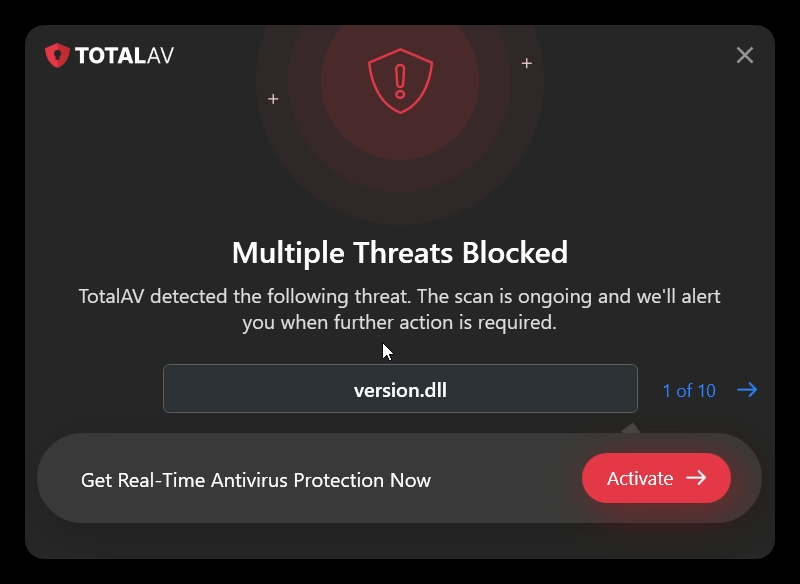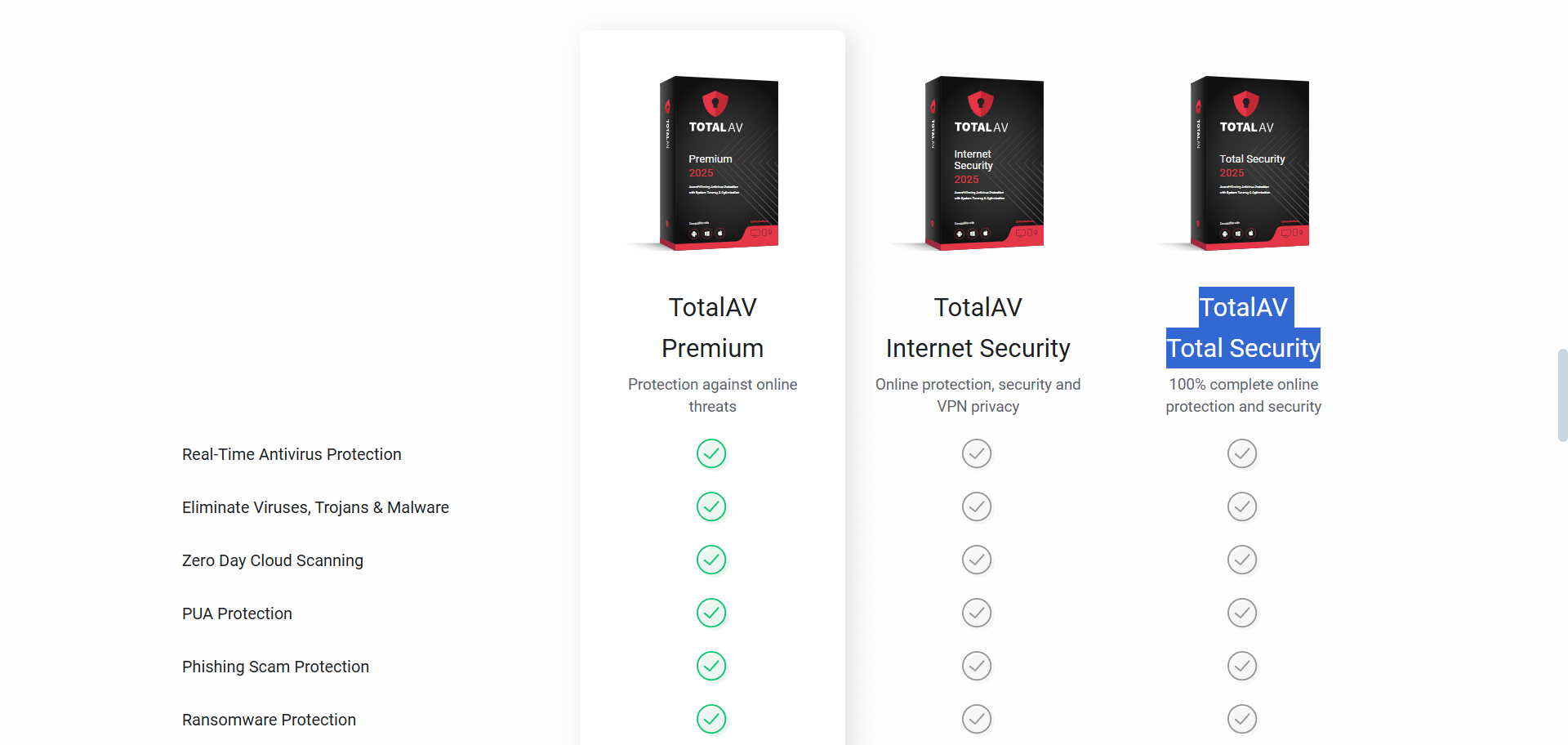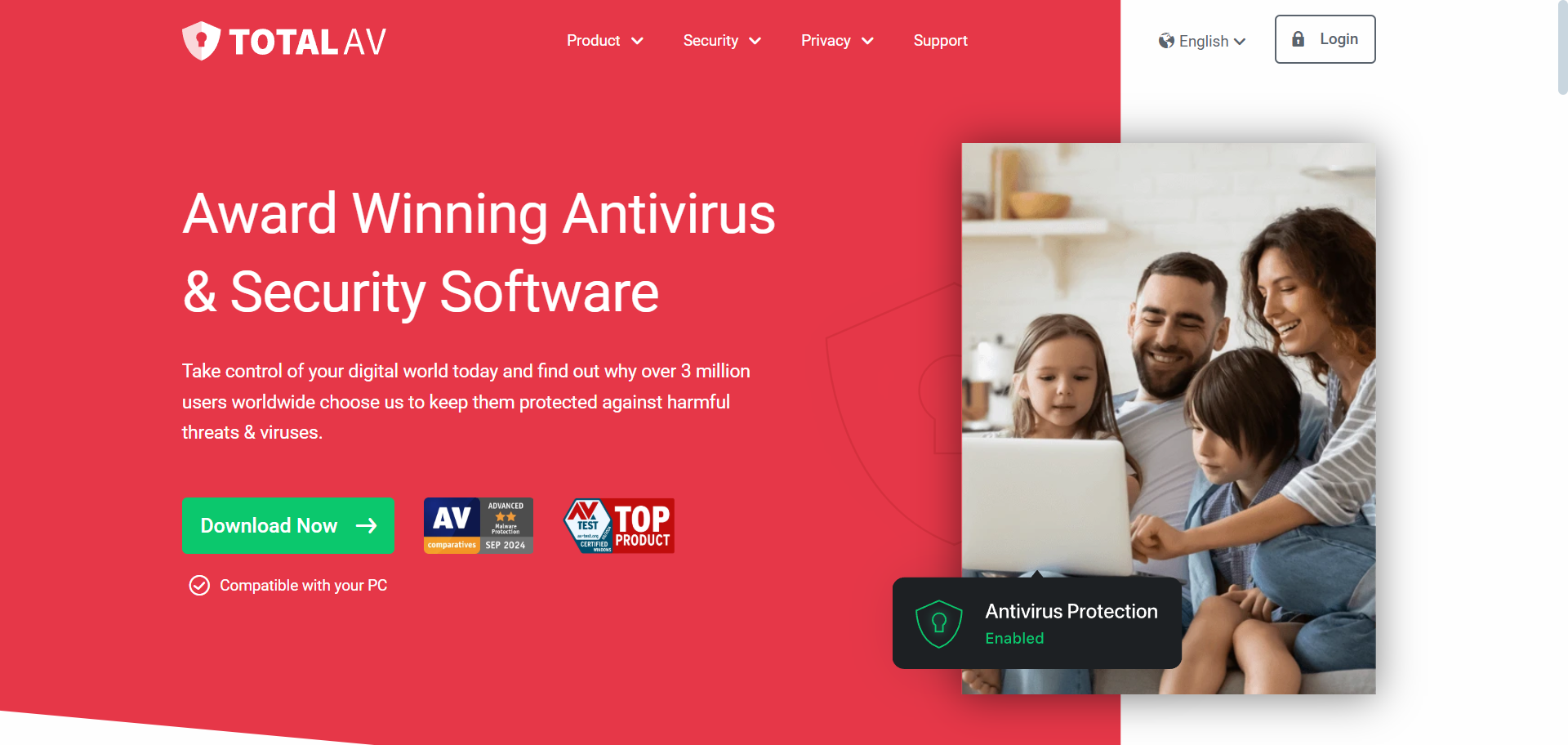TechRadar Verdict
TotalAV offers strong protection against malware and phishing, earning high scores in independent tests, but it slightly lags behind top competitors like Bitdefender. Its on-demand malware scan is solid, as is the user-friendly design, however, it doesn’t have advanced features that some premium competitors offer, plus the free tier is a bit limited in its capabilities.
Pros
- +
Great UI
- +
Available across multiple platforms
- +
Great scores from independent AV test laboratories
Cons
- -
Expensive
- -
No firewall
- -
Limited free version with upsell tactics
- -
Some features feel basic
Why you can trust TechRadar
In today’s antivirus market, you can be sure to find a lot of free versions of premium and not-so-premium AV apps. TotalAV certainly considers itself to be a premium product, snagging a couple of awards here and there, and like most in the field offers a free version which should give you a taste of the real product. Downloading and installing the free version took under five minutes (including the download of the antivirus engine), and we did not notice RAM usage spikes during this process. The initial scan was relatively quick, but the upsell tactics used made the entire experience feel like a marketing ploy. We understand that they’ve built the software and that developers and investors need to be paid; however, focusing on quality and value should bring in customers without aggressively upselling in the free version. It is basically a detection and removal program that offers real-time protection in the premium version. There are multiple bundles available, but the most comprehensive one includes an ad blocker, phishing protection, a secure browser, a VPN, and a browser extension that blocks malicious websites and trackers.

After you’ve installed the app, you will be greeted by a nice-looking UI that has all of its main elements logically laid out in the left-hand pane. While it may look simplistic, TotalAV hides a lot of its customization features under the settings menu, where you can get into the nitty-gritty of how you want TotalAV to behave. One positive thing we noticed is that regardless of the version you’re using (Windows, macOS, Android, or iOS), the layout plus look and feel are almost the same. Note, macOS and iOS have some features missing, but that’s mostly due to the inherent security features found in Apple’s ecosystem. Luckily for Windows users, TotalAV manages to get respectable scores from independent testing labs, ensuring that you’re well protected if you choose to install TotalAV on your PC.
Features
If you opt for the paid version of TotalAV, you will be covered with real-time protection, which automatically scans your files and programs to prevent malicious code from executing on your PC. Note, you will probably be able to download some malware (if you try this on purpose), but you will not be able to run it on your machine as TotalAV will block it immediately. In theory, as long as you keep your AV running, you should be protected. This will also keep you safe from ransomware, but in combination with TotalAV’s WebShield extension, which blocks malicious URLs and low-trust websites, you truly get an all-around malware and ransomware protection. Once WebShield is incorporated, it provides “safe search” automatically. It grades every website before you click on it, making sure that it's safe before you actually visit the website. Independent testers claim that WebShield manages to detect 96% of fraudulent websites, which sounds impressive until you see that competitors like Avira, McAfee, NordVPN, and a couple of more block 100% of these websites. Of course, this may not be a deal breaker if you’re a more advanced netizen who can easily recognize phishing websites, but it’s important to note that WebShield is by no means a perfect solution.
TotalAV offers a couple of malware scans, the “quick”, looks at the critical locations, and such a scan took under five minutes on the work laptop with an SSD roughly filled to 35% of its capacity. System scan, on the other hand, is a full scan that takes over 20 minutes, scanning over 250,000 files. If you tend to forget scans, you can schedule them, or finally, you can customize scans to your liking. Finally, the smart scan feature bundles a quick scan for malware, a security and privacy scan, a performance scan and a system junk and duplicate files scan. If you’re in a hurry, the smart scan makes a lot of sense, though a word of caution, look manually through the duplicate files; the system is not foolproof.
If you want to address the functioning of your system, you can individually launch TotalAV’s junk cleaner. It scans for junk files, like cached update files, .temp files, and items in the recycle bin. Such apps can be useful, but again, we would offer a word of caution: if you’re not an advanced user, it would be best to skip this option, as it can delete some useful files. Under the performance functionalities, you will also find an application uninstaller, We cannot recommend it over the built-in Windows uninstaller, unless you have a broken uninstaller and simply don’t know how to remove an application. Finally, the startup manager and browser cleaner feel more like gimmicks; they offer one-click access to these functions, but it's not more advanced in any way than what you get with your task manager or browser on your Windows machine.
With Chrome removing some popular ad blockers from its extension store, TotalAV’s Total Adblock comes to the rescue. It’s an extension for most popular browsers (or an app on iOS and Android) that aims to improve your browsing experience by blocking ads, which can also contain malicious code (depending on which websites you’re frequenting). Furthermore, if you opt for a higher tier plan (TotalAV has three), you will get a VPN in the bundle. Most of these bundled VPNs are not as good as standalone solutions, so if you’re in dire need of a VPN, TotalAV doesn’t have much to offer here. It has solid features, primarily in terms of security, thanks to OpenVPN and WireGuard protocols. There is a kill-switch, no-logs, and AES-256 encryption. You also get access to servers across roughly 30 countries with 50 servers. Compared to stand-alone VPN solutions, the number of servers is quite small, but you get major hubs in the US and Europe, so if you’re not picky, it can help you get around some geo-location blocks.
If you opt for the most expensive tier, aside from the VPN, you will also get a password manager in the bundle. You will need to install the browser extension if you want to take advantage of the auto-fill options. Once everything is set up, you will have to create your master PIN that will allow you to access the app vault. Total Password uses a zero-knowledge architecture, AES-256 bit encryption, and a random password generator. If you’re registering an account for the first time, the extension will ask you whether you want it to auto-generate a password for you. An additional function is the Security Report tab, in which the application will check the strength and safety of your passwords, but it does not perform dark web scans for your passwords. In addition, you can protect your password manager using two-factor authentication. After all is said and done, it’s not much different from Chrome offers in-built with its password management, making this a difficult buy. We found the Secure Notes and Remote Logout functions the most useful. Notes allow you to store text (answers to security questions, for example) and Remote Logout, as the name suggests, logs you out of other devices, which can be a useful feature if you tend to access your accounts from various machines.
If you’re on Android, TotalAV is simple to download and set up, with the app containing pretty much every feature included in the desktop version. Here is a quick run-down of the features in the Android app:
- Smart Scan
- System Optimization
- Wi-Fi Checker (verifies that your current network connection is secure and safe)
- App Lock (restricts access to apps containing sensitive information)
- Breach Scan (checks if your personal data has been exposed in known security breaches)
- QR Code Scanner (safely analyzes QR codes to prevent malicious redirects or links)
- VPN Access
- Web Shield
- Secure Browser
We did not test the iOS version, but according to other reputable reviewers, it contains most of the same functionalities.
Pricing

TotalAV offers three pricing tiers (if you exclude the free one), which differ in the offer and the number of devices you can cover. As stated in the introduction, you have the free version, which is quite limited, and in which you will get bombarded with upsell notifications. If you decide to go for the paid version, the initial plan is misleadingly called TotalAV Premium, starting at $29 for the first year, and renewing at a whopping difference of $99 a year. It covers up to three devices and does not contain the VPN or the password manager. Moving up to TotalAV Internet Security, you get a VPN along with all other functionalities from the first tier and coverage for six devices for $39 for the first year and a renewal cost of $129 a year. Finally, you have the TotalAV Total Security for eight devices, for $49 for the first year and a renewal cost of $149 a year. Besides everything in the previous plans, you also get the password manager added to the mix. Looking at the renewal prices and the performance of the additional features, it’s really difficult to justify going for the higher-priced plans.
Protection
According to the Malware Protection Test March 2025 performed by AV-Comparatives, TotalAV scored a 95.8% in Offline detection rate, 98.9 % in Online detection rate, and 99.97% in Online protection rate. Unfortunately, from a total of 19 tested products, TotalAV had pretty poor results in the false alarms domain. It managed to trigger 28 false alarms, whereas competitors like Kaspersky triggered only 3. Finally, in the AV Comparatives Malware Protection, it has been awarded one star, or standard protection. Competitors like Norton, BitDefender, Kaspersky, etc., have all been awarded three stars for advanced protection, making TotalAV a difficult sell over the competition. A security product that catches more malicious files isn’t always better if it also triggers frequent false positives. In some cases, a solution with slightly lower detection rates but fewer false alarms can offer a more balanced and user-friendly experience.
Ease of use
Perhaps the best feature offered by TotalAV is its ease of use, or user-friendly and logically laid out design. Even when you dig deep into the Configuration part to customize how TotalAV works, you will be greeted by flip-switches and a great explanation on what each feature does. We also applaud the fact that the design philosophy has been followed across all platforms, so whether you’re on Windows or Android, you will be greeted by a familiar surrounding and everything will be where you expected it to be. Updates can be performed silently in the background, and if you’re looking to remove TotalAV from your PC, it can be done in under two minutes, with all residual files of the AV being removed.
Final verdict
TotalAV is, in itself, an overall solid AV that comes packed with a lot of features even on the lowest paid plan. The upsell to higher-tiered plans simply doesn’t work for us, we would much rather have a separate VPN and use Chrome’s built-in password manager or opt for a separate app like 1Password. Similarly, the free version of TotalAV is also hard to recommend since there are better free alternatives out there, especially ones that won’t try to upsell you as hard.
Taking a final look at the entire package and comparing its independent laboratory AV tests, we come to the conclusion that TotalAV will surely have a slice of the market. But if you ask us, we wouldn’t bet on TotalAV jeopardizing the likes of BitDefender, Norton, and the like. If you can snag it on a huge discount, it can make a lot of sense as your go-to AV. Otherwise, take a look at the premium competition and forget that TotalAV even exists.
- Want to compare TotalAV to its rivals? Check out our best antivirus guide
Sead is a seasoned freelance journalist based in Sarajevo, Bosnia and Herzegovina. He writes about IT (cloud, IoT, 5G, VPN) and cybersecurity (ransomware, data breaches, laws and regulations). In his career, spanning more than a decade, he’s written for numerous media outlets, including Al Jazeera Balkans. He’s also held several modules on content writing for Represent Communications.
You must confirm your public display name before commenting
Please logout and then login again, you will then be prompted to enter your display name.
